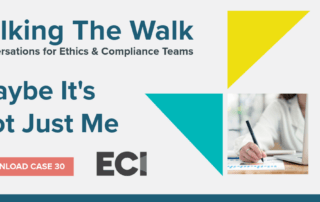Global Business Ethics Survey – U.S. Trends
This year’s GBES highlighted some significant takeaways about the state of ethics & compliance in the workplace across several dimensions: • For the first time, the survey explores whether where employees perform the majority of their work—remote, on-site, or “on the road”1—can impact the employee’s experience and the organization’s ethical
Encouraging Workplace Civility During Turbulent Times
Accountability — Accepting and Ensuring Responsibility
Accountability is accepting or ensuring responsibility for decisions or actions, especially when those actions fail to live up to standards or core values. Accountability is tied with behaviors and attitudes that leaders work hard to instill in their organizations. Using data from the most recent iteration of the Global Business Ethics Survey® (GBES®), ECI explored: employees’ perceptions and experiences; practices, particularly those of managers, that reinforce the belief that accountability is present; and the link between accountability and other facets of an organization’s ethics culture.
EthicsStat #2 March 2024
Misconduct is less likely to be seen in organizations that welcome diversity.
Obstacles to Business Integrity: A Report from ECI’s Global Business Ethics Survey®
Ethics in the Age of Disruptive Technologies
This session will examine the critical intersection of ethical considerations and emerging technologies. We will explore how to move from principles to practice in implementing disruptive technologies throughout the product life cycle, fostering responsible innovation while upholding ethical standards.
Changing Our Mindset About Corporate Responsibility: A Challenge to the Business Community
Perhaps now more than ever, business leaders are called on to address and manage a multitude of risks and opportunities on a global scale. With rapidly evolving technologies, urgent global issues, and stakeholders who expect more and have platforms for voicing their opinions like never before, being in business is increasingly complex. Complicating matters further, debate continues about the extent to which companies should act, particularly with regard to environmental and social challenges that arise in and beyond their operations. While a myriad of important laws and regulations have emerged to encourage companies to define and address specific issues, these are not sufficient. Critical business decisions — particularly when it comes to strategy, risk, and stakeholder impact — fall into grey areas where rules, frameworks, and laws will never be clear enough. Instead, these are ethics questions which require responsible businesses to respond by looking beyond what they must do and identifying what they should do.



